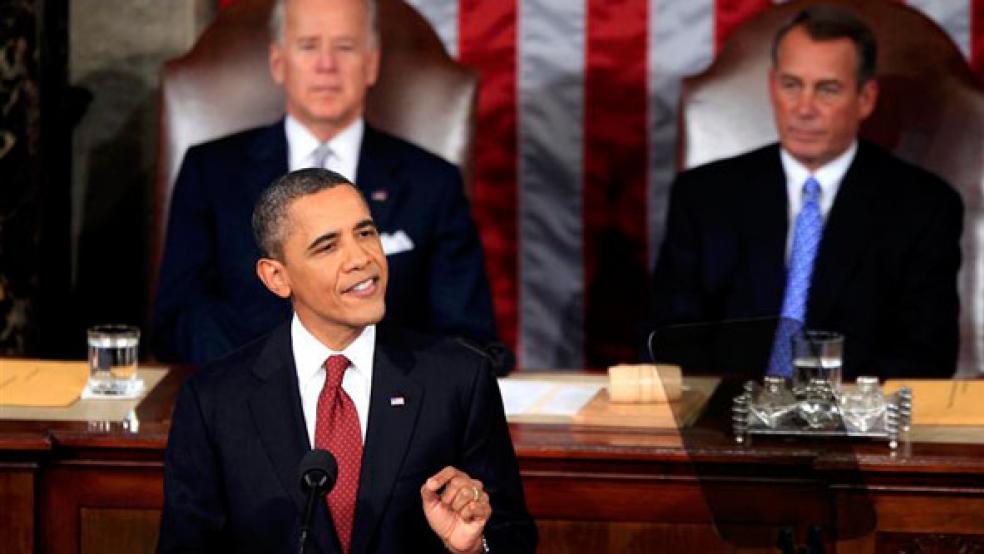The contents of President Obama’s State of the Union address next week aren’t a state secret. He began spelling out his second term agenda in his inaugural address two weeks ago and in a handful of high-profile remarks that followed.

His priorities aren’t shocking: Immigration reform with amnesty for undocumented workers; tougher gun control that bans high-capacity magazines; addressing climate change, and a “balanced” strategy for reining in the deficit through a combination of spending cuts and tax hikes on the wealthy.
Next Tuesday night is a chance to appease his base, sound presidential and play as nicely as possible with House Republicans who have blocked his agenda.
“The State of the Union address is Obama's opportunity to suggest some practical compromises on immigration, gun control, debt-reduction, and other topics,” said University of Virginia political expert Larry Sabato. “Certainly, he won't want to negotiate with himself, but a president can send signals by what he mentions and doesn't mention, what he puts first in a list of possible reforms, and even the words he stresses as he delivers the speech.”
But what if Obama jettisoned this predictable script and jarred the nation with a deadly serious conversation about the administration’s unfinished business—creating jobs?
The [State of the Union] should focus on how best to get the nation back on a path to full employment,” says Henry Aaron, an economist with the Brookings Institution. “This is today’s problem. The waste of potential output, currently running at roughly $1 trillion a year, is bad enough. The erosion of human capital of the millions of long-term unemployed and the blighted careers of the millions of young labor force entrants are even worse, injuries from which the nation will suffer for decades in lost potential output even after full employment is restored.”
Unemployment remains at a historically high 7.9 percent. The economy has shed 5.9 million full-time jobs since the start of the Great Recession at the end of 2007, according to the Bureau of Labor Statistics. Even after more than four years of recovery, the equivalent of Los Angeles and Houston’s combined populations cannot find a 35-hour a week gig.
“We are still in a crisis-level jobs hole,” the Economic Policy Institute’s Heidi Shierholz said in response to last week’s payrolls report. “The jobs deficit is so large that at January’s growth rate, it would take until 2021 to get back to the pre-recession unemployment rate.”
Obama acknowledged the scope of the problem after entering office in 2009. He launched a $787 billion stimulus and implemented an auto industry bailout that preserved millions of jobs. Former administration officials later acknowledged that the stimulus was much too small given the threat to the economy.
But it mostly lapsed in 2011, as have many subsequent measures – including a two-percentage point payroll tax cut that ended with the start of 2013. Last month’s fiscal cliff deal preserved emergency long-term unemployment benefits at an estimated cost of $30 billion, a meaningful but modest attempt to aid the economy. The White House even let the two-year charter for its Council on Jobs and Competitiveness expire last week.
None of this should surprise the president who noted in his re-election speech last November, “You elected us to focus on your jobs, not ours.” But since securing another four years in the Oval Office, Obama has focused on gun control, climate change, and by default on deficit reduction.
The emphasis on deficit reduction—while needed—has also proven counterproductive, since the focus is on more than $85 billion in cuts through the budget sequester that is scheduled to begin. Fears about these automatic spending reductions caused Pentagon spending to fall by 22 percent in the final three months of last year, a drop-off substantial enough that the entire economy dipped slightly.
The Obama administration notes that the economy is still improving, while putting the blame on congressional Republicans who oppose more stimulus spending and prefer more immediate deficit reductions.
“We have seen consistent job growth over almost three years,” White House press secretary Jay Carney said last week. “Home prices are starting to climb back. Consumer confidence overall has been rising and consumer spending has been rising. But there’s more work to do and our economy is facing a major headwind … and that's Republicans in Congress.”
But what the Obama administration has done—when pushing stimulus policies in the past—is antagonize the Republican House majority, submitting proposals that stood no chance of garnering conservative support.
And even if Obama placed a renewed emphasis on jobs, there is a question of whether he would recycle most of the ideas from his September, 2011 joint address to Congress.
That speech called for a one-year extension of the Social Security payroll tax holiday, which Congress granted and then allowed to expire as part of the fiscal cliff deal last month. Most of the remaining planks would require billions more in spending: tax credits to encourage hiring, $50 billion for infrastructure projects, another $10 billion to capitalize an infrastructure bank, $30 billion to modernize school buildings, $15 billion to refurbish foreclosed homes, and $35 billion to keep teachers, firefighters, and police officers on local government payrolls.
Should Obama choose to bring the State of the Union’s focus back to jobs, he could even repeat the opening few lines.
“Tonight we meet at an urgent time for our country,” he said back in 2011. “We continue to face an economic crisis that has left millions of our neighbors jobless, and a political crisis that’s made things worse.”





